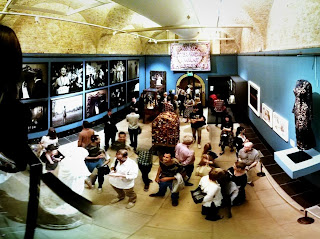This exhibition will delight lovers of the unexpected, the whimsical and the unusual. It is the first to be held in the United Kingdom to offer a major examination of Victorian revivalism and includes twenty eight contemporary artists whose work (either in its entirety, or specifically for this exhibition) has looked back to the nineteenth century with very post-modern twenty first century eyes. Recognised names such as Yinka Shonibare, Grayson Perry and Mat Collishaw appear alongside (among others) the wonderfully sounding Neo-Victorian Kitty Valentine, Miss Pokeno and Otto von Beach. Photography, film, textiles, kinetics, taxidermy and drawing are all included in this multi-media, multi-sensory gem.
Film Still from Damaged Goods, Barnaby Barford
Although a haunting beauty emanates from much of the art, this is soon followed by a sense of unease and even Barnaby Barford’s animated film Damaged Goods, a love story played out by porcelain figurines on the back shelves of a bric-a-brac shop, contains a Gothic sensibility within it. This mix of the contemporary and the Gothic is also wonderfully captured in the mechanical objects of Collishaw’s Magic Lantern and Paul St George’s Geislich Tube. Along with Simon Venus’s mechanized theatre set In Two Minds, these beautifully crafted pieces could have been created in an alchemist’s workshop. Behind the thin veneer of nostalgia and fantasy, irony and politics can also be read in the work a number of artists featured, particularly in Shonibare’s Dorian Gray photographs looking at his identity as a black British man and Jane Hoodless’s commentary on the changing role of women in Victorian society in Shorn Out of Wedlock.
In Two Minds (detail), Simon Venus
Shorn out of Wedlock, Jane Hoodless
Surprisingly,
for a vegetarian and animal rights supporter, I found the most engaging and
original work came from Polly Morgan (Why
Do We Wait 3), Miss Pokeno (Trophy
Chair) and Tessa Farmer (Mignon,
Ambushed by a Mob of Fairies), all who used stuffed animals in their
work! I can only hope (probably
naively) that the animals used met a natural death, but I do think there is
something very noble that the status of animals such as a tiny finch, the much
loved/hated fox and even bees can be raised and immortalized in a piece of fine
art. If I was a betting fledging art
historian, I would put money on a long and successful career for both Morgan
and Farmer. Their work is very original
and beautifully crafted, while still retaining an avant-garde edge. If, of course, they source their animals in
any other way, then I withdraw my support and implore them to find more humane
sourcing methods!
Trophy Chair, Miss Pokeno
With the
exception of one artist, Chantal Powell, all the artists featured had managed
to engage with Victoriana so well that on some occasions their work would have sat
easily in a genuine 19th century home or institution. Unfortunately, Powell’s work by comparison
just seemed a bit lazy and naive. She
had three pieces featured Siren (plastic
flowers in a parrot cage), Nightingale’s
Rest (an installation comprising of multiple plaster casts of cherubs on
miscellaneous pieces of white painted furniture and) and another piece which so underwhelmed me I
did not even write the name down (peacock feathers fixed to some form of wire grid). Compared to the other artists, Powell’s work just
gave the impression of an (average) degree graduation show.
Overall
though, a visit to Victoriana: The Art of Revival, will not disappoint. The stand out piece was Farmer's Mignon, whose assault/intervention on Edwin Roscoe Mullin's 1881 marble sculpture of the same name, was funny, irreverent and bold. Congratulations must also go to the exhibition's curator Sonia Solicari, for her extremely
unique vision.





